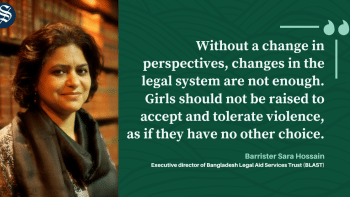The violence that separates us

What is our collective responsibility to our women and girls? How do we care for 50.43 percent of our population? What does this year's 16 Days of Activism against Gender-Based Violence—which begins on November 25, the International Day for the Elimination of Violence Against Women, and goes until December 10, Human Rights Day—hope to accomplish? The dates November 25 and December 10 are important in their own rights: they signify the still largely unresolved issue of accepting gender-based violence (GBV) as a human rights issue. Curiously, such reluctance is both universal and particular. From the local disinclination to respect women's reserved seats on the bus to the global antipathy towards women's safety issues at the workplace or the denial of wage disparity, women's rights issues are overwhelmingly regarded as a gendered matter, and therein lies one of the fundamental problems of our time.
Why is something as hauntingly abhorrent as femicide or something as grotesquely commonplace as sexual molestation considered women's issue, and therefore problems that women ought to solve themselves? The answer is deceptively, heartbreakingly simple: women and girls are not given the status of full human, and therefore their issues remain minoritised, and hence not deserving of the full force of the "human" attention. A secondary reason has to do with the liberalist individualist tradition that bars us from feeling the pain of others, and encourages us to consider ourselves as creatures whose lives are separate from others. It is this individualist and, frankly, Westernised bias that disables us from seeing women's and girls' rights as what they are: an issue that is everyone's.
Consider, for instance, some of Bangladesh's recent statistics with regard to GBV. According to Ain O Salish Kendra (ASK), between the months of January and October this year, 503 women were raped in the country. Within the same time frame, 960 documented cases of violence against children were filed and 421 children were killed, while 183 women were murdered by their husbands.
The numbers not only present a dire, terrifying picture, but they also baffle. Even with the knowledge that the real number is much higher as many cases go unreported, the sheer scale of the horror leads to a kind of incomprehensibility and, in turn, the thinking mind begins the process of actively disavowing the notion that each number represents a person. A person who was killed, raped, maimed, left disfigured and wounded—physically and psychologically.
This process of detachment, one where we separate ourselves from the pain of others, permits us to move past the trauma of GBV endemic to our society. Detaching ourselves from our own collective trauma—for it is ours even when we think we are not actively affected by it—allows us to think only of ourselves, and not of others and others' pain.
Here's the simplest of truths: we cannot continue to keep thinking about gender-based violence in abstract terms. We can no longer accept the bare minimum from our families, from our workplaces, from our public spaces, from our healthcare system, from our educational institutions, from our faith-based institutions. If we are ever to see an end to this maelstrom of violence against women and girls, we must first acknowledge their humanity, and second, we must confront their pain and actively work towards reducing it.
Historically, here as well as elsewhere, women's rights movements, feminist activism and gender justice movements have attempted to make visible the pain experienced by women and girls. In Bangladesh, whether it is the anti-dowry law, The Hill Women's Foundation's attempt to draw attention to the repression faced by indigenous women, Naripokkho's advocacy towards building a linguistically inclusive and unbiased manner of articulating women's experiences, particularly of trauma, or the Bangladesh Garment and Industrial Workers Federation's demand for a liveable minimum wage as well as safe and fair working conditions—these movements and campaigns have shed important, urgent light on the injustices faced by women and girls. Women's activist movements in our country have undoubtedly made significant strides towards making heard the voices that have been rendered voiceless or, to quote Arundhati Roy, that have been "deliberately silenced, or preferably unheard."
Yet, no amount of feminist activism, whether done through the process of advocacy, protest or a combination of both, is enough to bring an end to GBV when women's and girls' lives are considered less than that of their male counterparts. And no degree of feminist action plans or global calls for action will alter the reality of women's and girls' lives if those directly unaffected by it continue to consider it a non-issue or an issue for someone else.
It is everyone's responsibility to challenge our dominant, hegemonically masculinised cultural mindset, and its desire to keep marginalised the vulnerable of our society. Such a challenge can take many forms, including inclusive activism that goes beyond performative allyship, temporary solidarity, donor-centrism, or even ableism. Beyond activism, quotidian acts of resistance and, in their absence, even a drive towards change can help make significant improvements to the quality of women's and girls' lives. From workplaces ensuring gender-balanced participation in decision-making, to domestic chores not squarely falling on the shoulders of women and girls, to public spaces not attacking women for daring to demand space, to educators and policymakers acquainting themselves with the prevalence of gender-based injustices and attending to curb them, to state- and government-level interventions to ensure such violent actions do not go unpunished, there's so much that can be done. There's so much that needs to be done.
Because here's the simplest of truths: we cannot continue to keep thinking about gender-based violence in abstract terms. We can no longer accept the bare minimum from our families, from our workplaces, from our public spaces, from our healthcare system, from our educational institutions, from our faith-based institutions. If we are ever to see an end to this maelstrom of violence against women and girls, we must first acknowledge their humanity, and second, we must confront their pain and actively work towards reducing it.
As hard as it might be to empathise with each victim of gender-based violence, the alternative is apathy, and for a country where 51 percent of young women are married in their girlhood (according to a Unicef report), we are in no position to be apathetic.
Not caring for women and girls is not an option for us. Not raising our voices against gender-based violence is not an option for us.
Dr Nazia Manzoor is assistant professor at the Department of English and Modern Languages, North South University (NSU).
Follow The Daily Star Opinion on Facebook for the latest opinions, commentaries and analyses by experts and professionals. To contribute your article or letter to The Daily Star Opinion, see our guidelines for submission.

 For all latest news, follow The Daily Star's Google News channel.
For all latest news, follow The Daily Star's Google News channel. 










Comments